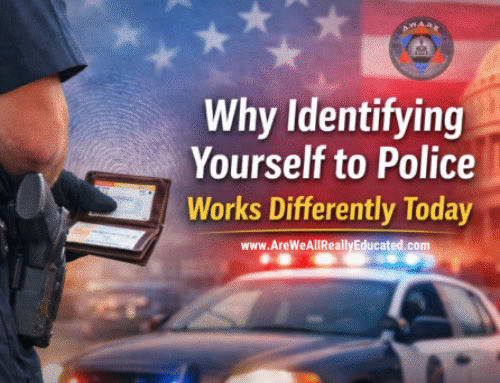The first principle one must learn if they are to maintain their unalienable rights in common law is this:
“The government (as it is currently set up) has the legal right to ‘absolutely control’ (e.g. disregarding the Constitution) anything that it creates.” This is because the following documents that people accept from their government are all “quasi-contracts” (driver license, social security card, voter registration card, credit cards, motor vehicle certificate of title, motor vehicle registration, summons and complaints, the registration of your real estate for taxation, etcetera) and therefore can be adjudicated outside of the Constitution. Now, isn’t that a kick in the head! (You can learn more about the development of this subject in terms of its impact on the legal world in professor Joseph Vining’s 1978 book Legal Identity, The Coming Age of Public Law.)
In other words, are you aware, that your name on all of the above-mentioned documents has been “converted” into a “legal fiction,” and forms what is known as a “fiduciary trust” in relation to the quasi-contract that works like an adhesion contract. You might say that the driver license is similar to a waiver of rights, although the rights waived may be reclaimed at anytime provided that notice is given. As briefly explained in the Introduction, an “adhesion contract is a standardized contract form offered to consumers of (government) goods and services on essentially a ‘take it or leave it’ basis without affording the consumer a realistic opportunity to bargain” on the terms 10 of the contract. In other words, it is an unconscionable contract and therefore void of effect.
Regarding your name, under the common law and according to the publication American Jurisprudence: Use and acquisition “At common law, a person could adopt any name he or she wished, without resort to any court and without legal proceedings, provided it was not done for fraudulent purposes, and this rule is continued in some states by statute.”
This means you are not restricted (other than by use with fraudulent intent) with regard to any name that you wish to use to identify yourself. According to this common law principle, it is up to you to determine what your name is. In other words, it is your right to make this determination with regard to your identity. Not even the government can interfere with or force you to identify yourself by any name to which you would otherwise not recognize nor consent.
When dealing with the government and its agents, in order to preserve your identity and the rights that go with it, it is best to identify yourself by your True Name. What do I mean by your “True Name?” The name your parents gave you: your first and middle names. Your true name does not include your family name. Only the first and middle names. John Steven rather than John Steven Smith (spelled, of course, with upper and lower case letters, and not in a stylized form in all capital letters). This way your name doesn’t become confused with the legal fiction recorded by the government on their documents. It is crucial that you fully understand this principle as it is the basis for which government contacts or has any business at all to do with you. If you know when to consent (through identification) and when to withhold consent, you’ll be able to avoid a lot of problems created by government in order to create a legal controversy.
When government records a legal fiction name, it records that name written in ALL CAPITAL LETTERS. Have you ever noticed how your name is presented on any bill that you receive in the mail (whether from the power company, the telephone company, your bank, or a government entity like the county treasurer)? It’s always typed in ALL CAPITAL LETTERS. This is a stylized usage used by government and other corporations (fictitious entities) so that they can deal with you in the capacity of “doing business as” (or DBA) with another legal fiction. But just because government wants to deal with you in this manner, doesn’t mean that you have to deal with it in this manner. If you allow government to construct a trust (such as the driver license, with all its undisclosed terms and conditions) around your legal name (which, by the way, includes your last name) and you agree to use that legal name as your identity when dealing with government, then you’ve just opted into its jurisdiction and lost all your unalienable rights! It all comes down to being aware of what you are consenting to in any given situation.
If you find yourself in a situation where you are asked for your license and you decide to turn it over, stop before handing it over and make it perfectly clear to the officer that: “I’m showing this for competency not for identification.” Make sure the officer understands what you have just done, because what you are saying is: “I do not consent to being identified by this document.” There have been instances where officers have gone back to their cruiser, presumably for some onboard communications with headquarters, and then returned to hand back the DL with only a warning about whatever infraction they thought they had caught. In other words, no citation, no written warning. Because you preserved your rights just by knowing how to assert them through non-consent to be identified by government documents. If you identify yourself properly the officer will not likely proceed against a name different than that of the constructed fiduciary trust.
If asked what your name is, as was just mentioned above, use only your True Name (i.e. First Middle), so that you can avoid making a connection with the FULL or LEGAL name on the card. In order to further make this point, consider having another card made and changing your signature on your driver license to First Middle. It is likely the Department of Transportation won’t allow you to eliminate your last name on the printed card, but you can change the way you sign the license. Then once you have your amended card, if you ever have to give it to an officer, you can announce clearly:
“Officer, I am not showing you this driver license for identification purposes. I am only showing it to you to prove my competency to operate this auto, and so you know I keep a valid insurance policy active on it. I am noting your name and hope that you will recall this conversation accurately on the witness stand at trial – how I just identified myself to you. My name is clearly spelled there on the signature line.”
What happens when someone neglects to do this is that the court will construct a trust contract (also known as a “constructive trust” in legal terminology) from your consent to be identified by the driver license. You signed the quasi-contract (license), therefore you have implied an agreement to follow the traffic code. However, even if you happen to make this mistake, there are ways to overcome it. This exception (and what you have to do in a timely manner) will be covered in more detail in a later chapter.
There are things you can do to preserve your rights. Whenever you find yourself in a courtroom situation or when signing any paper or document (or instrument, such as a traffic citation) pertaining to any government or corporate agency, you can reserve your rights by signing above your signature with one or more of the following reservations: “Without Prejudice,” or “All Rights Reserved,” or “Not Amenable,” or, if you are being coerced to sign under threat of jail, “Under Protest” or “Under Duress.” Now, this isn’t a silver bullet cure-all if you don’t know how to use it, however it does establish a reservation of rights (as well as a fatal error for the courts) for the natural man (as opposed to the legal fiction, who generally has no rights under natural law). It must be understood that a reservation of Rights, by its declaration (or documentation) alone, “vitiates” perjury and will not “sustain a promise or an appearance” (meaning an “appearance” in court).
Consider the following court holding with regard to a reservation of rights:
“It must be permitted of men to buy their peace without prejudice to them. It has been held that one may buy his peace by compromising a claim which he knows is without right (Daily v. King 70 Mich. 568, 44 N.W. 959) but the compromise of an illegal claim will not sustain a promise.” Read v. Hitching, 71 ME 590.
According to law, liability of all parties to a contract is discharged if any party has no right of action or recourse. If remedy is not allowed in a contract (such as the quasi-contract with the driver license) then there is no actual contract at law (meaning according to the common law) that can legally be enforced. That is, unless you (ignorantly) consent to its enforcement.
The court can establish in personam jurisdiction just based on the fact that you failed to rebut the assumption that you are of a class of people who are controlled by the traffic codes. However, once you rebut that assumption, you have shifted the burden of proof, and now it is incumbent upon your opponent to disprove the rebuttal through verified (sworn) evidence. This means that the officer or the prosecuting attorney has to come up with verified evidence (meaning under penalty of perjury) that positively refutes your rebuttal. The only problem with this is: if there was no injured party, they never have any such evidence. And therefore, they have no case.
Another way that you waive your right to due process is by not challenging subject matter jurisdiction. One way to challenge subject matter jurisdiction is by asking for a verified complaint. The officer or prosecuting attorney is representing a corporation, a fictitious plaintiff, and bringing a claim on the presumption that a contract exists between the state and the defendant, an ignorant victim. The ignorant victim (yourself) does not know that this presumption even exists, does not know that the cause of action cannot be in the common law because a crime in law requires a corpus delecti, that is, the “body of the crime” or an injured party, and a corporation cannot be the body of the crime or an injured party because it is artificial, a fiction. Without a verified (sworn) complain from a real, live party to the action who has sustained an injury, there is no case.
What most ignorant victims aren’t aware of is: the state is attempting to prosecute the suit without entering evidence into the record of the contract which binds the defendant to the law. Without such contract (and without your objecting to this on the record and insisting that an actual contract be produced and entered into evidence) the trial court is wholly in want of subject matter jurisdiction and venue jurisdiction. If the court proceeds once this jurisdiction is challenged (that is, once the defendant demands to see the contract from a real party to the action), it would be proceeding without judicial immunity, therefore opening itself up to a civil law suit and a criminal offense under federal law.
This means that the judge and everyone associated with this fraud can be sued as perpetrators to a fraud; the prosecuting attorney (if there is one) for barratry and bringing a case with unclean hands, the judge for lack of jurisdiction, and all of them for conspiracy to fraudulently conceal the true nature and cause of the accusation. Such a criminal act could even be taken to the federal courts if need be. Title 18 of the federal United States Code at Chapter 13 section 241, Conspiracy against rights, protects the public from criminal actions by public officials.
Title 18 provides that everyone from the trainer of law officers to the judge to the dispatcher to the director of revenue to the law officer himself may be named as conspirators in any kidnaping (i.e. what they might call an “arrest” but which is, rather, a false arrest).
18 U.S.C. §241, Conspiracy against rights,
If two or more persons conspire to injure, oppress, threaten, or intimidate any person in any State, Territory, Commonwealth, Possession, or District in the free exercise or enjoyment of any right or privilege secured to him by the Constitution or laws of the United States, or because of his having so exercised the same; or
If two or more persons go in disguise on the highway, or on the premises of another, with intent to prevent or hinder his free exercise or enjoyment of any right or privilege so secured –
They shall be fined under this title or imprisoned not more than ten years, or both; and if death results from the acts committed in violation of this section or if such acts include kidnaping or an attempt to kidnap, aggravated sexual abuse or an attempt to commit aggravated sexual abuse, or an attempt to kill, they shall be fined under this title or imprisoned for any term of years or for life, or both, or may be sentenced to death.
For instance, if you were to prove the state’s failure to adequately train its officers or agents (concerning rights, concerning diversity of jurisdiction etcetera) it could be tantamount to a conspiracy against rights in violation of Title 18 U.S.C. §241. If your state driver license was done with a reservation of rights, making clear that there was no intent to become a fiduciary trust for JOHN S. SMITH, that any attempt on the government actor’s part to bypass the refusal for cause or the reservation of rights would be deemed a conspiracy against rights per Title 18 U.S.C. §241.
Most people do not know what is meant by the phrase “without prejudice” in conjunction with their name when signing a contract. Generally, it means the following: “I have exercised the remedy provided me under the common law whereby I might timely, validly, sufficiently, and explicitly reserve my common law right not to be bound by, nor be compelled to perform under any contract, franchise, or commercial agreement in which I did not enter intentionally, knowingly, and voluntarily, and by such reservation of right, I have notified all administrative agencies of federal, state, and local governments that I do not and will not accept the liability associated with the compelled benefits of any such unrevealed contract, franchise, or commercial agreement.”








Leave A Comment